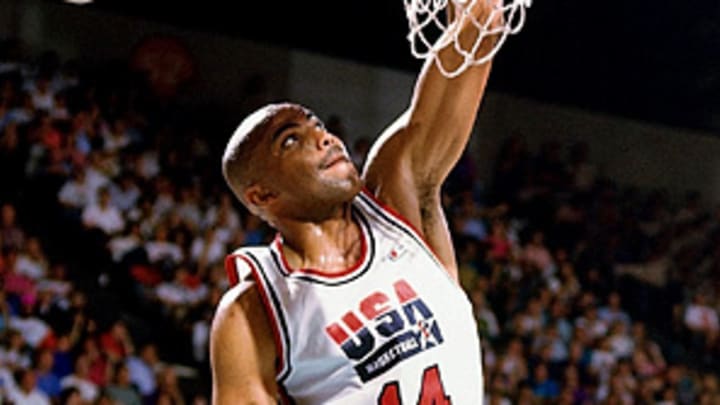Ever-glib Barkley knows where he ranks in Dream Team pecking order

If I've heard it once, I've heard it a dozen times:
What was your interview with Charles Barkley like for the book about the 1992 U.S. Olympic basketball team?
And my answer is always the same: Great. Just like your interview with Charles Barkley would be.
A rule that I rarely broke in three decades with Sports Illustrated was to not ask questions at news conferences. Why would I want everyone to know the direction of my story? (I did break the rule once in a while to be a smart aleck; I once asked Pat Riley how a player was supposed to "take it to the next level" while also "staying within himself," both nuggets being Riley staples when he coached the Lakers.)
Well, when you talk to Charles, you might as well be at a news conference. He will answer you with candor and humor but everyone will hear his response. He says anything to anybody and everything to everybody, and what you're trying to do as a journalist is find out something that no one else will get. Two days after my interview with him, I heard Charles say some of the same things on TNT that he said to me.
[Photo Gallery: Rare pictures of Charles Barkley]
But that doesn't mean that the evening wasn't illuminating, and, above all, entertaining.
To arrange the Dream Team book interview with Charles I called on Julie Fie, the Phoenix Suns' vice president of public relations and just about the best in the business. See, I could text or call Charles a hundred times and maybe -- maybe -- get one back, but Julie is on his A-list. She was Barkley's go-to person for the four seasons that he was a shining Sun, and my guess is she has enough material for a 500-page book just on running interference for Charles.
I called Julie, she called Charles, he called her back, and dinner in Phoenix was arranged. Charles shows up close to on time, but it takes him 10 minutes to negotiate his way to our table because he stops to talk to virtually everyone in the restaurant.
My goal is not to dwell on the Olympics. I had spent a lot of time with Charles in that summer of 1992, and the memories came back to me easily. There are a significant number of pages in Dream Team devoted to rambling on La Rambla, Barcelona's most famous street, with Charles. And before that, in one of the most memorable days of my life, I had a fascinating round of golf with Charles, Clyde Drexler and Newsday's Jan Hubbard in Monte Carlo. The expanded version is in Dream Team, but suffice it to say that on the ride home we were all planning how the obituaries would read if I ran the rental car off the road in the mountains surrounding Monaco. Which almost happened.
[Photo Gallery: Classic pictures of the Dream Team]
What interests me for this evening is: How, in Barkley's opinion, has he reached the point in our divided society when he can say almost anything and get away with it? I have the feeling that Charles could advocate the mass execution of kittens, face five minutes of outrage, then be asked to do the keynote at an SPCA convention. So I ask Charles how he had gotten to that place where few others (anyone?) have ever been.
"Because I trust the people," says Barkley. "I trust them to know that I'm not mean-spirited. Let's say I call someone on the basketball court a midget. Clearly, I'm not trying to insult [expletive] midgets. I'm just talking about a guy who's short compared to other players."
"But, see, that's my point," I say. "Other people would say the same thing and not really mean it, but they would get pilloried for using 'midget.' Maybe get run off the air."
"Well, all I can say is that people know I'm not saying anything out of malice," answers Barkley. "Also, I think people respect the fact that I don't have a hidden agenda. I will criticize Kobe Bryant or anybody else.
"One of the reasons I hate the media," Barkley says, one his favorite themes even though he is with the media right now and has many, many friends in the business, "is this double standard. Oh, he's a nice guy, so he gets away with doing the same thing a bad guy did. I don't believe you get a pass."
The waiter comes around and offers truffle cauliflower soup as the appetizer special. "I don't know what a damn truffle is, and I sure as hell don't want no damn cauliflower," Charles says. It is hard to determine if Charles really doesn't know what a truffle is or if it's an act because someone like him -- a millionaire who is also a man of the people -- should make fun of soups containing truffles.
It strikes me that I don't know -- or have forgotten -- how Charles got involved in broadcasting.
"The person who got me into the business was Dick Ebersol," says Barkley, referring to the former chairman of NBC Sports. "Dick thought I'd be good at it, and I was sure I was going to NBC when I retired. But then I did a favor for a friend in Philly, Steve Mosko, who ran Sony Pictures in L.A. He talked me into having dinner with Mark Lazarus, who ran [Turner] Sports" at the time and now has Ebersol's old job at NBC.
"So Mark asks, 'What do you think of our stuff?' And I say: 'You all suck. You guys don't have any fun. You're not curing cancer, you're not policemen. Have some damn fun.'
"And Mark says, 'You think you can do that?' And I say, 'I know I can.' "
And in 2000, Barkley signed on with TNT. You know how a writer will sometimes take the easy way out and write that "the rest is history"? Well, in this case, it's true. TNT's Inside the NBA has grown, in my opinion, into the best studio show in sports history.
"I know this," says Charles. "One of the worst days of my life was telling Dick Ebersol I was going to TNT."
I ask Barkley if he would've been -- could've been -- as provocative on the network as he is on cable.
"Honestly," he says, "I wasn't sure I could've. That's partly why I went to TNT."
Our meal has arrived by now, and Barkley glances at my entree. "Man, I should've gotten that," he says. "Black people love chicken, you know." A couple at a nearby table turn around and smile.
"But, see, that reminds me of TV," he continues. "Now, I say that on TV -- and I have said it --� and I trust people at home will know I'm [expletive] around.
"See, my hope and dream is that people have a good time watching basketball. It's not church. It's not serious. People think if they hear it on television, God said it. Hell, no. It might be an [expletive] who said it."
I ask him what he'd be doing if he weren't making $5 mil a year for working, as he often puts it, "one [expletive] day a week."
"I honestly don't know, and I can't give you some [expletive] answer," he says. "Do you know what you'd be doing?"
"Well, I can only do one thing," I answer.
"True," he says. "And I'm not sure you can do that. But it's different if you're a jock. I was having this conversation with a cab driver on the way over here. He says ..."
"Wait? You took a cab here?"
"Hell, yes. You can't drive in this city," says Charles. "When you're in jail, it's a long [expletive] weekend."
He points to my drink, a vodka, the first of what I thought would be at least two. "You're over the limit already," he says. "They lowered it so low you can't even have a drink. They're just doing it to make money."
Then he adds: "Oh, and you're taking me home."
(For those who need refreshing ...)
We talk about many other things: the 1984 Olympic team, from which he was famously cut by Bob Knight ("I was his scapegoat"); the 1996 Olympic team that followed the Dreamers ("a [expletive] nightmare"); his main regret as a player ("That I didn't get to Phoenix a couple years earlier so I didn't have to drag sorry-[expletive] teammates up and down the court"); and his status in the basketball world vis-à-vis Michael Jordan ("I was convinced at the time of the Dream Team I was the second-best player in the world ... and I do mean second").
The player with whom Charles will march lock step into history, though, is another Dream Team mate, Karl Malone. Understand that Barkley's comments should be prefaced by this: He and Malone are good friends. They both have complimentary things to say about each other, on and off the record, and it's not forced. But here is Charles' take on his talents compared to Malone's.
"Look, I'm in the top 20 of players who ever lived," says Charles. "When I first started out, they said, 'He'll never make it. Too short.' That never even concerned me. Because you know what? I could get all my stuff on my own.
"You take Karl. Karl needed John Stockton. That's not a knock on Karl; it's just a fact. I could get mine any time I wanted to. So I'll say it on the record: I was better than Karl. Nothing against Karl. He was great. But I was better. The only thing he did better than me was score, and that came down to John Stockton."
[Dream Team Excerpt: The greatest game nobody ever saw]
I ask Charles how much better he would've been had he dedicated himself to conditioning like Malone.
"I always laugh when I hear that," says Charles. "There are four guys who got 20,000 points, 10,000 rebounds and 4,000 assists. So I'm saying, 'What the [expletive] else could I have done if only four guys did the [expletive] I did?' Bill Russell, Wilt Chamberlain, Kareem and me."
(Actually, Charles has the number and the players wrong. Chamberlain, Kareem Abdul-Jabbar, Malone, Barkley and Kevin Garnett are the five players in this exclusive club.)
I express my own opinion about the Charles-or-Karl debate in Dream Team. But there is little doubt that the Barkley of Barcelona was the best Barkley ever.
"Chuck Daly [the Dream Team coach] paid me the greatest compliment I ever got in my life," says Charles. He told me, 'It's an honor and a pleasure to coach you. I got to play against you, but to watch you play every day, you're the second-best player here [behind Jordan] and every time we have an important game we start you."
That is incredibly egotistical.
Also incredibly correct.
It's time to go now, so Charles steps into my rental and we head for his home in Scottsdale. After a few miles, Charles tells me to pull over.
"I thought you were going home," I say.
We were in the parking lot of a bar.
"I have to go in for a while," he said. "You wanna come?"
"I gotta go, Charles. Anyway, I'm over the limit, right?"
"All right, Jack," he says. "You be good."
"You're gonna be able to get another ride home, right?"
He assured me that that would not be a problem.
Jack McCallum is the author of Dream Team. Purchase it here.
